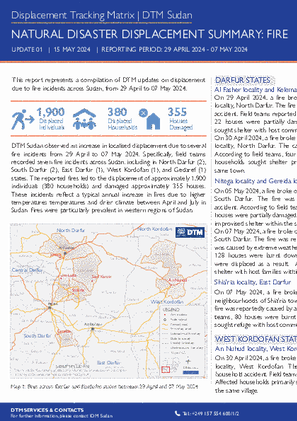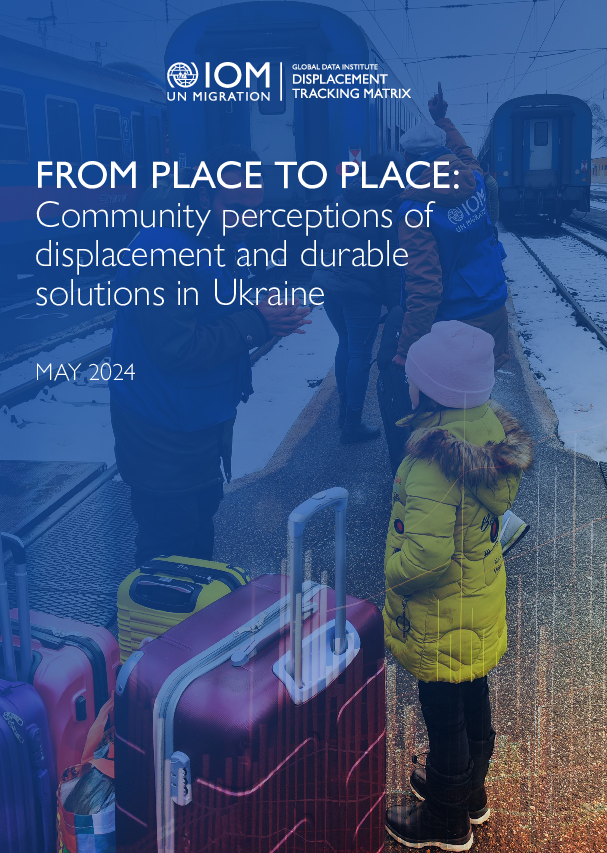-
Countries
-
Data and Analysis
-
Special Focus
-
Crisis Responses
Other

Contact
DTM Mozambique, DTMMozambique@iom.int
Language
English
Location
Mozambique
Period Covered
Apr 22 2024
Apr 24 2024
Activity
- Other
- Mobility Tracking
- Event Tracking
- Site Assessment
The Displacement Tracking Matrix (DTM), in collaboration with Mozambique’s National Institute for Disaster Management (INGD), conducted assessments in Maringue, Chemba, and Barue to record displacements caused by severe El Niño induced drought conditions. Mozambique's National Meteorological Institute (INAM) project decreased precipitation levels and drought conditions across districts in Central and Southern Mozambique - potentially impacting over 20 million people. El- Niño induced drought, land degradation and increased salinity in important water sources continue to place a strain on the agriculture, livestock herding and fishing industries, with many families unable to guarantee sufficient and sustainable livelihoods in rural areas.
DTM’s tracking of climate-induced displacement aims to provide data on the number and location of vulnerable families forced into displacement due to climatic and environmental factors. Joint assessments conducted between 22-24 April estimate 342 individuals (58 families) displaced from Northern Sofala and Tete districts to host communities of Manica (Barue district). Priority needs identified by IDPs include food security, access to clean water, adequate shelter, and agricultural inputs. Additionally, there is a pressing demand for non-food items such as hygiene kits, blankets, mosquito nets, and kitchen sets.

Contact
DTM Ukraine, dtmukraine@iom.int
Language
English
Location
Ukraine
Period Covered
Feb 01 2024
Mar 31 2024
Activity
- Other
За два роки повномасштабного вторгнення гуманітарна ситуація в Україні, зокрема поблизу лінії фронту, дедалі ускладнюється. У зв’язку з цим Відділ даних та аналітики Міжнародної організації з міграції (МОМ) розробив систему моніторингу населення прифронтових територій для відстежування мобільності та критичних потреб цивільного населення в місцевостях, що суттєво постраждали від конфлікту. Ця система включає три ключові компоненти: Оцінку мобільності та потреб (MaNA), моніторинг населених пунктів на прифронтових територіях і моніторинг потоків у зонах евакуації. MaNA містить інформацію про оцінену чисельність населення з дезагрегацією за статтю та віком на рівні громад, а також про оцінену частку населення, що має гострі гуманітарні потреби. Моніторинг населених пунктів на прифронтових територіях надає змогу отримувати деталізовані базові розрахункові показники населення, а також інформацію про основні гуманітарні потреби у вибраних населених пунктах, розташованих у межах 25 км від лінії фронту, для ефективнішого розроблення сценаріїв та попереднього планування гуманітарної допомоги. Крім того, МОМ постійно відстежує динаміку переміщень, щоб надавати гуманітарним партнерам дані про напрями й масштаб переміщень із вибраних населених пунктів, де проходить евакуація. Кожен із цих компонентів спрямований на підтримку координації дієвого гуманітарного реагування, забезпечення безпеки та добробуту постраждалого населення прифронтових територій.

Contact
DTM Ukraine, dtmukraine@iom.int
Language
English
Location
Ukraine
Snapshot Date
Mar 19 2024
Activity
- Other
Ефективні ініціативи з відновлення та розвитку значною мірою спираються на дані, зібрані на місцевому рівні. Використання даних у плануванні та реалізації заходів з відновлення та розвитку гарантує, що ці процеси будуть підзвітними, фактологічно обґрунтованими та відображатимуть потреби громади.
Цей семінар мав на меті дослідити поточну та можливу роль даних у місцевих ініціативах з відновлення в Україні. Для цього в семінарі взяли участь представники Міністерства з питань відновлення, обласної та місцевої влади, донори, а також міжнародні та українські гуманітарні організації та організації, що займаються питаннями розвитку. Під час серії структурованих панельних дискусій учасники семінару розглянули потреби та виклики, з якими стикаються при створенні та використанні даних на місцевому рівні, щоб задовольнити вимоги відповідно до національної стратегії планування відновлення та залучити необхідну міжнародну допомогу.
У цьому звіті узагальнено обґрунтування та викладено основні моменти дискусій, які були зосереджені на очікуваних результатах семінару. Нарешті, на основі цих обговорень у звіті представлені деякі висновки та рекомендації, запропоновані учасниками.

Contact
DTM Ukraine, dtmukraine@iom.int
Language
English
Location
Ukraine
Snapshot Date
Mar 01 2024
Activity
- Other
Зміни до критеріїв отримання допомоги, які набули чинності в березні 2024 року, обмежили доступ до допомоги на проживання ВПО на основі певного набору профілів соціально-економічної вразливості. Запровадження додаткових критеріїв має на меті забезпечити, щоб соціальна допомога в Україні була здатна підтримати найбільш вразливі верстви населення, як серед переміщених осіб, так і серед населення в цілому. Однак це збільшує ризик виключення деяких вразливих осіб, які можуть втратити доступ до допомоги на проживання ВПО за новими критеріями. Таке скорочення щомісячного доходу домогосподарств може вплинути на здатність вразливих домогосподарств задовольняти свої базові потреби та відновлювати своє життя.
Мета цього тематичного нарису — надати огляд оціночної частки та кількості ВПО, які все ще можуть мати право на отримання грошової допомоги ВПО за новими критеріями. Використовуючи наявні вторинні дані, цей тематичний нарис має на меті надати орієнтовний огляд частки та кількості ВПО, які більше не матимуть права на отримання допомоги, незважаючи на те, що вони є вразливими до скорочення доходів домогосподарств, яке може вплинути на їхню здатність задовольняти базові потреби. Цей документ має на меті інформувати та підтримувати адвокаційну діяльність і розробку програм гуманітарних партнерів на додаток до нової схеми виплати грошової допомоги ВПО.
Примітка: Ця записка була переглянута 26 квітня 2024 року, щоб відобразити останні зміни до Постанови 332, які набули чинності 22 березня. Очікуваний вплив тепер відображає найновіші критерії для отримання права на отримання грошової допомоги на проживання для ВПО

Contact
iomnigeriadtm@iom.int
Language
English
Location
Nigeria
Period Covered
May 06 2024
May 12 2024
Activity
- Other
On 7 May 2024, armed bandits attacked Sakajiki community in Kaura Namoda LGA, Zamfara State. The incident led to three fatalities and four injuries, affecting 219 homes and 1,097 individuals. Among the affected were 614 children, 259 women, and 224 men. The displaced population moved to neighboring communities within Kaura Namoda LGA, including Arewa, Shiyar Nafiu, and Sabon gari. The attack resulted in the destruction or severe damage of 40 shelters and the loss of many possessions of households.
Of all the needs identified, food and non-food items (NFIs) were the most prevalent. Other needs included security, shelter, and health services.
Following these events, DTM (Displacement Tracking Matrix) field staff conducted rapid assessments to inform the humanitarian community and Government/partners, and to enable a targeted response.
Nigeria’s north-central and north-west zones are afflicted with a multi-dimensional crisis. Long-standing tensions between ethnic and religious groups often result in attacks and banditry or hirabah. These attacks involve kidnapping and grand larceny along the major highways by criminal groups. During the past years, the crisis has intensified and has resulted in widespread displacements across the north-central and north-western regions.

Contact
DTM Sudan, SudanDTM@iom.int
Language
English
Location
Sudan
Period Covered
Apr 29 2024
May 07 2024
Activity
- Other
Following the increase in localized displacement due to fires, DTM Sudan released the following report summarizing DTM updates on displacement due to fire incidents across Sudan, from 29 April to 07 May 2024.
DTM field teams reported seven fire incidents across North Darfur (2), South Darfur (2), East Darfur (2), West Kordofan (1), and Gedaref state (1). Some fires were reportedly caused by increased temperatures and drier climate conditions, while others were due to household accidents.
Highlights
- Fires displaced an estimated 1,900 individuals (approximately 380 households) between 29 April and 07 May 2024.
- Over 355 houses were partially damaged or destroyed by the fires.
- The fires resulted in localized displacement: the majority of displaced households sought shelter with host communities within the same locations.

Contact
DTM Ukraine, dtmukraine@iom.int
Language
English
Location
Ukraine
Period Covered
Feb 12 2024
Mar 15 2024
Activity
- Other
The War in Ukraine has caused massive displacement, with about 3.7 million people forced to flee their homes, land, and families. Most of them want to go back to where they came from, underlining the pressing need for a recovery and transition strategy that links humanitarian and development efforts, addresses the immediate needs of the communities affected by displacement, and prepares them for their collective future. Aware of this necessity and in line with the global action on internal displacement, the Ukrainian government, the UN, and partners are implementing a comprehensive recovery and transition plan that prioritises data-based approaches and participation so that the displaced people and their host communities can shape and achieve lasting solutions to their displacement.
This research report examines the views of the displaced and their hosts to understand their experiences, hopes, and preferences for durable solutions. It provides useful insights to inform the creation of a 'Joint Analytical Framework' in Ukraine to track progress towards solutions pathways and guide future policies and programs.

Contact
DTM Ukraine, dtmukraine@iom.int
Language
English
Location
Ukraine
Period Covered
Feb 01 2024
Mar 31 2024
Activity
- Other
Over two years since the full-scale invasion of Ukraine, the humanitarian situation, especially near the frontline, has grown increasingly complex. In response, the International Organization for Migration (IOM) Data and Analytics unit has developed a frontline monitoring system to track mobility and critical needs of civilians in heavily conflict-affected areas. This system integrates three key components: the Mobility and Needs Assessments (MaNA), frontline settlement monitoring, and evacuation tracking. MaNA provides information about the estimated population disaggregated by sex and age at the hromada level and the estimated proportion of this population facing acute humanitarian needs. Frontline settlement monitoring provides granular baseline population estimates, as well as primary humanitarian needs in selected settlements within 25 km from the frontline to support scenario-planning and prepositioning of humanitarian assistance. In addition, IOM continuously monitors evacuations to provide humanitarian partners with data on the direction and scale of movements from selected settlements undergoing evacuation. Each component aims to support the coordination of effective humanitarian response, ensuring the safety and well-being of affected frontline populations.

Contact
DTM Libya, DTMLibya@iom.int
Language
English
Location
Libya
Snapshot Date
Apr 30 2024
Activity
- Other
- Survey
- Flow Monitoring Survey
The findings of this study confirm that lacking travel documents is a contributing and exacerbating factor driving vulnerability among migrants in Libya. The data points to migrants’ experiences including whether they are able to obtain a work permit or a passport being strongly influenced by a range of factors including the conditions in the country of origin (e.g. ease of access to government-recognised ID), migration drivers (e.g. war and conflict hindering migrants’ ability to obtain the necessary travel documents), migration intentions (e.g. those who do not intend to stay in Libya are less likely to possess a travel documents) and means of transportation used to reach Libya (e.g. those having traveled by air are more likely to possess travel documents).
Overall, nine in ten migrants interviewed by DTM in November and December 2023 in Libya were without a work permit. Moreover, nearly two thirds of migrants did not possess a passport, a key precondition in obtaining a work permit.

Contact
DTM Libya, DTMLibya@iom.int
Language
English
Location
Libya
Snapshot Date
Apr 06 2024
Activity
- Other
This Rapid Needs Assessment provides a snapshot of the situation of the Sudanese nationals who arrived in the municipality of Tobruk after the onset of conflict in Sudan in April 2023. DTM Libya conducted a brief assessment on 3 - 6 April 2024 to shed light on the situation of Sudanese nationals in the municipality of Tobruk who arrived after the onset of conflict in Sudan in April 2023. While most are coming directly from Sudan and arriving in Alkufra, a minority are traveling from Egypt and arriving in Tobruk.
Pagination
- Previous page
- Page 6
- Next page
